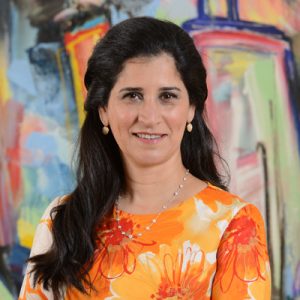HH Sheikha Intisar AlSabah is the founder of Intisar Foundation and Alnowair; two non-profits focused on advancing mental health, youth well-being and women empowerment. A princess from Kuwait’s royal family, she is a formidable force for change committed to spreading peace and positivity in the Arab region. Sheikha Intisar tells Alliance about her transformative ideas, the role of positive psychology and her own personal experiences in informing her philanthropic work.
Heba Abou Shnief: As a pioneering female figure in the space of mental well-being and social transformation, what principles, values or experiences have helped guide your philanthropic giving?
Sheikha Intisar: From my family experience and my own observations, philanthropic giving in Kuwait and the region emanates either from the heart or the mind. This seemingly binary division has been long-standing with charitable giving being the preponderant form of giving in Kuwait, as well as other neighbouring countries, such as Saudi Arabia. We see the influx of charitable giving when there is a health crisis, famine or when other natural catastrophes hit the region – or there is our religiously-guided giving. It is a humanistic instinct that is driven by impulse. This sense of solidarity is high and manifests across borders. However, this giving tends to stop and is somewhat temporary. When the mind takes over, and you start thinking about the bigger picture, then another process sets in and that is the process of inquiry and exploration of root causes of suffering and injustice.
My father’s charitable giving was a big eye-opener for me and a trigger to consider other ways of giving. He made a large donation, but there was no lasting impact as the giving did not have any guiding social change objective, nor did it have any sort of measurement of the effect of such giving. Because I wanted to see his giving having a more lasting impact, I started to ask many questions about sustainability and change.
I believe that this was an important juncture in my philanthropic journey, as it helped me see the need to connect the mind and the heart. This was the moment when my shift towards more structured and long-term giving started.
For me, seeing the strength of women overcome adversity and heal emotionally from the devastating consequences of conflict, to feel good about themselves and adopt a more positive outlook on life is what drives me not only to give but to commit to the long haul.
Can you tell us more about your philanthropic journey and the key lessons gleaned that could help shorten the learning curve for other philanthropists?
When I started my first NGO – Alnowair in 2013, I wanted to achieve positive social change in Kuwait but I was unsure how to do it. Back then, we did not know anything about the impact of positive psychology. There was an enormous amount of effort put into running various programmatic interventions, yet with too little achievement warranting this amount of effort. Looking back it at now with a more seasoned perspective, I believe it was a fragmented effort that was not sufficiently informed by evidence-based insights, strategic thinking and cohesive goal setting.
We started a process of brainstorming and reflection, asking ourselves many questions. Through research, we discovered an influential Harvard study (Happiness Advantage by Shawn Achor) on positive psychology and its role in promoting mental well-being and positive social behavioural change. We started to diagnostically look at the opportunities to promote behavioural change.
I give considerable weight to the importance of measuring impact.
The education system, which has a primary role in influencing youth social and communal roles, as well as labour outcomes, was the natural place to start. Our conventional educational system is not keeping pace with the fast pace of change and the explosion of connectivity. We wanted to advance notions such as mental well-being, optimism, and positive attributes among youth and replace existing negative attitudes such as lack, pessimism, and incapacity.
We worked with specialists and academia to design a programmatic intervention that would introduce positive psychology in public schools in Kuwait. So, we introduced our first pilot in three schools working with three teachers at the start. This was our baseline. In exactly six weeks, we began to see measurable change! We did our summative evaluation and took the results to government, because we wanted to show them with evidence the potential of this intervention so that they can help us scale it.
We now have two robust models that we are advancing at scale: Bareec trains teachers in public schools how to implement interactive positivity exercises to empower students with the benefits of positive thinking, and Boomerang is a first-of-its-kind anti-bullying school outreach program in Kuwait promoting positive values through the performing arts. Now, we work with a vast network of 47 high schools, and we have trained over 500 teachers to implement Alnowair’s programmatic methodology reaching 17,000 students.
The devastating grip of conflict in the region has a traumatic effect on women in conflict zones. We see this most glaringly with the Palestinian and Syrian refugees that we work with
I give considerable weight to the importance of measuring impact. We wanted to know from the outset how our programmatic interventions in Kuwaiti schools were having an impact on youth. We worked with a professor from Kuwait University to develop our KPIs and started measuring indicators like youth outlook on life and measuring academic performance over time. As we introduced these initial metrics, we started to build on them systematically and improve our programmatic feedback cycle. It is true also that there are also intangible effects we have seen that are not captured in numbers, nonetheless meaningful attention to the role of data and impact measurement has helped us deliver and set our work apart.
Collaboration is also another element in our formula for success. We partner with ministries, like-minded organisations and community-based organisations (CBOs). No matter how strong we are as an NGO we would have never had access to all these teachers and secure the commitment of schools unless the Ministry of Education was on board. Additionally, tapping on the expertise of like-minded organisations is important so that we do not reinvent the wheel and benefit from cumulative experience. Working through CBOs is critical to trust-building and regaining power within the communities.
Last but not least, having a passionate executive team that are on the ground engaging directly with the women beneficiaries is another key determinant of our success.
Given the need to balance different roles and responsibilities, what initiative are you currently prioritizing?
Through Intisar Foundation, we are working on the One Million Arab Women initiative that seeks to empower one million women through drama therapy by 2050.
The devastating grip of conflict in the region has a traumatic effect on women in conflict zones. We see this most glaringly with the Palestinian and Syrian refugees that we work with in the refugee camps in Lebanon. We also work with Lebanese and Jordanian women that are experiencing the ripple effects of conflict. Our intervention works on alleviating the trauma through drama therapy. Because the aim is to scale our interventions, we are currently working through theatre troops that don’t necessarily work with women. We reached the conclusion that by building the capacities of theatre troops through training, we would be able to achieve wider accessibility to women. Step-by-step, my aspiration is that the One Million Arab Women initiative will transform into a grassroots movement for peace.
Another programmatic intervention we are focusing on is Bareec, which I had just mentioned. Bareec aims to instill positivity among youth in public schools through curated curricula, and a teacher training methodology based on the positive psychology. We are working with professors from Colombia University to develop accreditation for a fully-fledged programme on positive psychology in schools.
As a firm believer in the role of positive thinking, I believe that philanthropists should start off with a positive mindset.
I am also highly committed to the cause of young women leadership. With interest and commitment from donors, we have introduced a pilot programme that uses applied theatre to unleash young female leadership. We have a research study conducted on the pilot and we are planning in 2023 to build on the results by training more trainers to expand the programme.
We have also worked with a research consulting firm to do a survey on mental health in Kuwait. We will be sharing the findings and insights with policy-makers to advocate for the integration of mental health well-being in our national development framework and core strategies.
These are my priorities for the coming period that I intend to devote my time and focus.
In light of Intisar Foundation’s strategic approach to working directly with grassroots non-profit organizations, what advice would you give to other philanthropists that have concerns about trustworthiness and capabilities of non-profits?
As a firm believer in the role of positive thinking, I believe that philanthropists should start off with a positive mindset. Framing our understanding of problems and challenges in a positive manner will go a long way. For instance, the research suggests that there is a dearth of talent in the non-profit sector. While this is arguably a challenge faced by philanthropic organizations we talk to, I believe that framing it into a positive manner will help unlock the potential. Through our initiatives Intisar Foundation and Alnowair, we believe that there is untapped talent and potential, but we just don’t see it. It is a matter of knocking doors and maintaining a positive outlook. In both organizations, we have found the right people show up at our door by simply spreading the word.
I am very optimistic about the future of philanthropy in our region.
Though it may sound simple, but I believe that common sense should guide decisions about partnerships coupled with a strong vetting process. In our case, we benefited from a strong partnership with the United Nations. We spoke the same language which really facilitated partnership. We were able to tap on their roster of vetted CBOs. Identifying CBOs that are strongly aligned with your mission is important. To get to the point of partnership, we would visit the CBOs 3-4 times at least, and we would also invite them to visit us. It is important to conduct field visits, get to know your partners and see what they are doing on the ground. This may sound rudimentary but in practice very few philanthropists engage directly with partners on the ground. All levels of management within the organization and even the board should go to the field and see programmatic execution on the ground. Unless this happens, how will you really know if you are having a tangible impact?
While we do acknowledge that some CBOs have capacity gaps in issues like reporting; however, they do have their own measurement frameworks and other strengths such as closeness and trust with communities. You need to use common sense on what works and what doesn’t rather than follow a checklist approach that is not necessarily suited for context.
How do you see the future of philanthropy in the region?
I am very optimistic about the future of philanthropy in our region. I believe the philanthropic landscape has changed considerably from where it was a decade ago. Notably, I am seeing an expansion in the pool of philanthropists, especially HNWIs. This is important as more philanthropists joining the space will encourage others to join in the future. I also see more evidence-based and collaborative approaches, as well as the increased digital connectivity and accessibility of learning tools that have significantly advanced our exchange of knowledge and best practices. I believe these emerging trends will continue in the foreseeable future.








Comments (0)